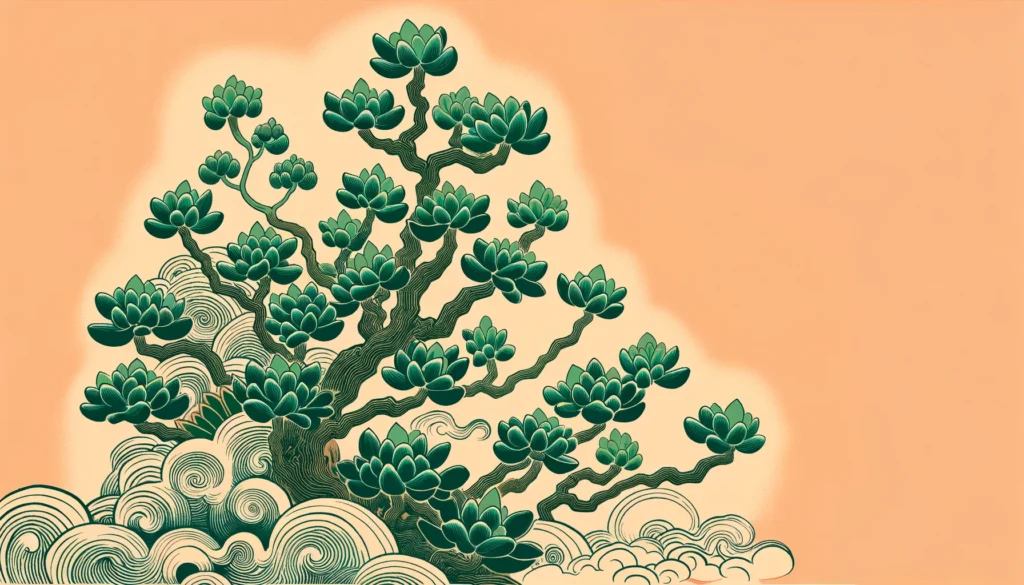

Home » Cat Plants » Is Your Cat at Risk from the Chinese Jade Plant?

Chinese Jade (Crassula ovata), also known as Jade Plant, Lucky Plant, or Money Tree, is a popular succulent houseplant. While not causing allergies in cats, Chinese Jade is considered a toxic plant to felines if ingested.
The plant contains unknown toxic compounds that can lead to various symptoms in cats. Chinese Jade is commonly found as a decorative indoor plant in homes and offices.
Ingestion may cause mild gastrointestinal upset, but is generally not life-threatening.
Ingestion can result in mild symptoms like vomiting, diarrhea, or drooling. Rarely fatal but may require veterinary care.
Eating these plants can lead to more pronounced symptoms like abdominal pain, lethargy, or difficulty breathing. Veterinary intervention may be necessary.
Ingesting even small amounts can cause severe symptoms like organ damage, seizures, or cardiac failure without rapid treatment.
All parts of these plants are extremely poisonous to cats and can quickly lead to death, even with immediate veterinary care.
** Please note: Please note that toxicity level can vary based on the amount ingested and the specific cat. It's always best to keep these plants completely inaccessible to cats and seek immediate veterinary care or call the poison hotline if you suspect your cat has ingested any part of a toxic plant.
If a cat ingests any part of a Chinese Jade plant, it may experience various symptoms. The most common signs of Chinese Jade toxicity in cats include:
In rare cases, cats may also exhibit tremors. Symptoms usually appear within a few hours of ingestion.
If you suspect your cat has ingested Chinese Jade, it’s crucial to contact your veterinarian immediately. The vet will likely perform a physical examination and review your cat’s medical history. They may also conduct diagnostic tests such as:
These tests help rule out other potential causes of the symptoms and confirm Chinese Jade toxicity.

A: Yes, cats can be allergic to Chinese Jade. Symptoms of an allergic reaction may include itching, sneezing, and skin irritation.
A: Yes, Chinese Jade, also known as Jade Plant or Crassula, is toxic to cats. Ingesting any part of this plant can cause symptoms such as vomiting, diarrhea, and lethargy.
A: Symptoms of Chinese Jade poisoning in cats include vomiting, diarrhea, excessive drooling, and abdominal pain. Immediate veterinary care is recommended if ingestion is suspected.
A: To prevent contact, ensure that Chinese Jade is not present in your home or garden. Keep your cat indoors or monitor outdoor activities closely to avoid exposure.
A: If your cat ingests Chinese Jade, contact your veterinarian immediately. Do not induce vomiting unless instructed by a veterinary professional. Immediate medical attention is necessary.
A: Yes, Chinese Jade is commonly found in homes and gardens as an ornamental plant. It is important to ensure this plant is kept out of reach of cats to prevent accidental ingestion.
Chinese Jade (Crassula ovata) is native to South Africa, specifically the dry, rocky hillsides and valleys of the Eastern Cape and KwaZulu-Natal provinces. The plant was introduced to Europe by Dutch explorers in the 17th century and has since become a popular houseplant worldwide.
In Chinese culture, the Jade Plant is believed to bring good luck and prosperity, hence its common names “Lucky Plant” and “Money Tree.”
Please note: The information shared in this post is for informational purposes only and should not be considered as veterinary medical advice.
🐾 A hilarious or heart-melting cat video
🐾 Our latest paws-on review of a cool cat toy